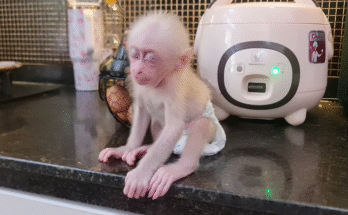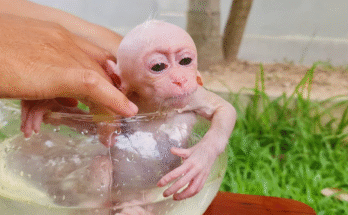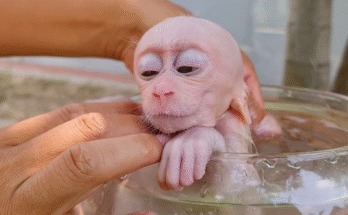Caring for a newborn monkey requires commitment, patience, and the right knowledge to ensure its health and happiness. Start by creating a warm, safe space with soft bedding to mimic the mother’s natural environment. Proper nutrition is essential; use specially formulated milk or consult a veterinarian for guidance. Hygiene is critical—sanitize feeding bottles and keep the living area clean to prevent infections. Social interaction is vital for the monkey’s emotional well-being; spend quality time bonding, but avoid over-handling to reduce stress. Regular check-ups with an exotic animal vet will help monitor growth and detect any issues early.

Tiniest World Newborn Baby Monkey Hug Himself To Sleep Not Yet Accept New Home
Caring for a newborn monkey requires patience, knowledge, and attention to detail. These delicate creatures need a warm environment to regulate their body temperature, especially during the first weeks of life. Proper feeding is crucial; consult a veterinarian to ensure the formula matches their nutritional needs. Hydration and hygiene are equally important to prevent infections. Weak newborns may require extra care, including round-the-clock monitoring and gentle handling. Building trust through touch and communication is key to their emotional well-being. By providing the right care, you ensure the monkey’s healthy growth and create a strong bond for life.

1. Understanding the Basics of Newborn Monkey Care
Newborn monkeys are highly vulnerable and depend entirely on their caregivers for survival. Their natural mothers provide constant warmth, nourishment, and emotional support, which must be replicated in human care to ensure their well-being.
Key Characteristics of Newborn Monkeys:
- Fragility: Their bones are soft, and their immune systems are underdeveloped.
- Dependency: They require frequent feeding and consistent care.
- Behavior: They exhibit clingy behavior, mimicking their natural bond with their mothers.
2. Creating the Ideal Environment
Temperature and Warmth
Newborn monkeys cannot regulate their body temperature effectively. A warm, controlled environment is critical during the first few weeks of life.
- Optimal Temperature: Maintain a room temperature of 85-90°F (29-32°C) using heating pads or incubators.
- Avoid Overheating: Monitor the temperature to prevent heat stress.
- Skin-to-Skin Contact: If possible, provide skin-to-skin contact to mimic maternal warmth.
Safe Habitat
Prepare a secure and clean space to house the newborn monkey.
- Use a small, enclosed area with soft bedding.
- Ensure the habitat is free from sharp objects or choking hazards.
- Regularly clean and disinfect the area to prevent infections.
3. Feeding Newborn Monkeys
Proper nutrition is vital for a newborn monkey’s growth and development. Since they rely on their mother’s milk in the wild, replicating their natural diet is essential.
Formula Feeding
Consult a veterinarian to determine the most suitable milk formula. Common options include:
- Specialized Monkey Milk Replacers: These are designed to mimic the nutritional profile of monkey milk.
- Goat’s Milk: Often recommended due to its digestibility and nutritional content.
- Human Infant Formula: Used in emergencies but should be adjusted for protein and fat levels.
Feeding Schedule
Newborn monkeys require frequent feedings:
- 0-2 Weeks Old: Every 2-3 hours, including nighttime.
- 3-6 Weeks Old: Gradually reduce nighttime feedings.
- 6 Weeks and Beyond: Introduce solid foods while continuing milk feeds.
Feeding Techniques
- Use sterilized syringes or baby bottles with small nipples.
- Feed the monkey in an upright position to prevent choking.
- Monitor their weight regularly to ensure proper growth.
4. Ensuring Proper Hygiene
Hygiene is crucial to prevent infections in newborn monkeys, whose immune systems are still developing.
- Bathing: Use warm water and a mild, animal-safe soap for occasional baths.
- Cleaning: Wipe the monkey’s body daily with a damp cloth to remove dirt.
- Diapering: If using diapers, change them frequently to prevent skin irritation.
- Sanitation: Regularly clean feeding equipment and the living area.
5. Medical Care and Monitoring
Newborn monkeys require routine medical care to address potential health issues.
Veterinary Visits
- Schedule a check-up within the first week of bringing the monkey into care.
- Regularly monitor for signs of illness, such as lethargy, diarrhea, or poor appetite.
Vaccinations
Consult a veterinarian about vaccination schedules to protect against common diseases.
Common Health Concerns
- Dehydration: Ensure adequate fluid intake to prevent dehydration.
- Respiratory Issues: Keep the environment clean and warm to avoid respiratory infections.
- Parasites: Administer deworming treatments as prescribed by a vet.
6. Emotional and Social Needs
Newborn monkeys are social animals that thrive on emotional bonding and interaction.
Building Trust
- Spend time holding and cuddling the monkey to establish trust.
- Use gentle tones and avoid sudden movements to create a sense of safety.
Simulating Maternal Care
- Wrap the monkey in a soft cloth to simulate being held by their mother.
- Use a stuffed animal for the monkey to cling to when you are unavailable.
Encouraging Socialization
- Introduce the monkey to other compatible animals or caregivers when appropriate.
- Provide toys and activities to stimulate their cognitive development.
7. Transitioning to Solid Foods
As the monkey grows, gradually introduce solid foods to their diet.
Suitable Foods
- Fruits: Bananas, papayas, and mangoes are excellent options.
- Vegetables: Offer cooked carrots, sweet potatoes, and leafy greens.
- Protein Sources: Introduce boiled eggs, tofu, or small amounts of lean meat.
Feeding Tips
- Cut food into small, manageable pieces.
- Monitor for allergies or digestive issues.
- Continue providing milk alongside solids until the monkey is fully weaned.
8. Preparing for Independence
As the monkey grows older, encourage independence to promote healthy development.
Gradual Separation
- Reduce the time spent holding the monkey to foster self-reliance.
- Encourage exploration within a safe environment.
Teaching Natural Behaviors
- Allow the monkey to climb and play to develop motor skills.
- Introduce them to natural foraging techniques using hidden treats.
9. Ethical Considerations in Newborn Monkey Care
Caring for a newborn monkey comes with significant ethical responsibilities.
Legal Compliance
- Ensure you have the necessary permits and licenses to care for the monkey.
- Follow local wildlife protection laws and regulations.
Long-Term Commitment
- Understand that caring for a monkey is a long-term commitment requiring time, resources, and dedication.
Conservation Awareness
- Avoid supporting illegal wildlife trade or exploitation.
- Contribute to conservation efforts by educating others about the importance of protecting monkey habitats.
10. Frequently Asked Questions
How often should I feed a newborn monkey?
Newborn monkeys should be fed every 2-3 hours, including nighttime feedings, during the first two weeks of life.
What should I do if the monkey refuses to eat?
If the monkey refuses to eat, check the temperature of the milk, ensure the feeding equipment is clean, and consult a veterinarian if the problem persists.
Can I raise a newborn monkey as a pet?
Raising a monkey as a pet is not recommended due to their complex needs and the ethical concerns surrounding wildlife care. Always consult with experts and consider alternatives like wildlife sanctuaries.
Conclusion
Caring for a newborn monkey is a rewarding but challenging responsibility that demands time, dedication, and knowledge. By providing proper nutrition, a safe environment, emotional bonding, and medical care, you can help ensure their healthy growth and survival. Always prioritize ethical practices and consider the long-term welfare of these incredible creatures. With the right care and commitment, you can make a significant difference in the life of a newborn monkey.



